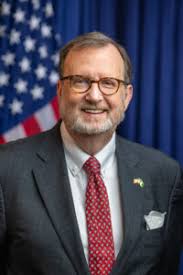The United States is shifting its engagement strategy with Nigeria and sub-Saharan Africa from traditional aid to a focus on private sector-led investment. This new approach, driven by a belief in the private sector’s power to fuel sustainable economic growth, aims to foster mutually beneficial trade and investment partnerships. Nigeria, as the US’s second-largest trading partner in Africa, plays a crucial role in this evolving relationship. The US Ambassador to Nigeria, Richard Mills Jr., emphasized this shift, highlighting the transition from aid recipient to commercial partner as the cornerstone of the US’s future engagement with African nations. This strategy acknowledges the significant investments made in Nigeria’s health, education, and agricultural sectors over the decades, while recognizing the need to evolve beyond aid and leverage the nation’s vast economic potential.
The core of this new approach lies in the Commercial and Investment Partnership (CIP) agreement signed between the US Department of Commerce and Nigeria’s Ministry of Industry, Trade and Investment. This five-year memorandum of understanding prioritizes three key pillars: agriculture, the digital economy, and infrastructure. Nigeria is one of only five African countries selected for this partnership, underscoring its strategic importance to the US. The CIP framework establishes collaborative working groups within these sectors, fostering direct dialogue and joint problem-solving between the two governments. The US sees this partnership as a catalyst for strengthening commercial ties, driving investment, and creating new business opportunities for both countries.
Ambassador Mills lauded the Nigerian government’s receptiveness to US business concerns and its commitment to economic reforms. He acknowledged the difficult but necessary reforms undertaken by the administration, including tax reforms aimed at streamlining a complex system that previously burdened businesses with numerous levies. While recognizing the short-term pain these reforms may cause, the ambassador expressed optimism about their long-term positive impact, anticipating the emergence of new economic opportunities as a result. The improved macroeconomic environment resulting from these reforms is viewed as crucial for attracting US investment and fostering a more conducive business climate.
Despite these positive developments, challenges remain, particularly in the power sector. Ambassador Mills identified electricity distribution and transmission as a major obstacle for US companies, especially those in the technology sector eager to tap into Nigeria’s burgeoning tech talent pool. Recognizing the critical role of reliable power for economic development, the US is supporting smaller-scale, off-grid energy solutions through initiatives like Power Africa. This approach aims to bypass the systemic challenges plaguing the national grid, providing more immediate and localized power access to support businesses and communities.
The US government’s strategic shift represents a recognition that sustained economic growth is ultimately driven by private sector investment, not aid. This new approach aims to unlock Nigeria’s vast economic potential by fostering a stronger, more dynamic commercial relationship. By focusing on key sectors like agriculture, technology, and infrastructure, and by addressing critical challenges like power access, the US seeks to create a more attractive and enabling environment for private sector investment. This strategy aims to benefit both countries, promoting mutual economic growth and strengthening bilateral ties.
The success of this new approach hinges on several factors. Continued commitment from both governments to the CIP framework and its prioritization of key sectors are crucial. Addressing systemic challenges, particularly in the power sector, will be essential for attracting and retaining foreign investment. Equally important is maintaining open communication and collaboration between the US and Nigerian governments to address emerging challenges and ensure the reforms continue to move forward. The US Embassy’s role in facilitating dialogue and advocating for US business interests will remain vital to the success of this partnership. Ultimately, this shift from aid to trade represents a significant evolution in US-Nigeria relations, with the potential to unlock substantial economic opportunities for both nations.














